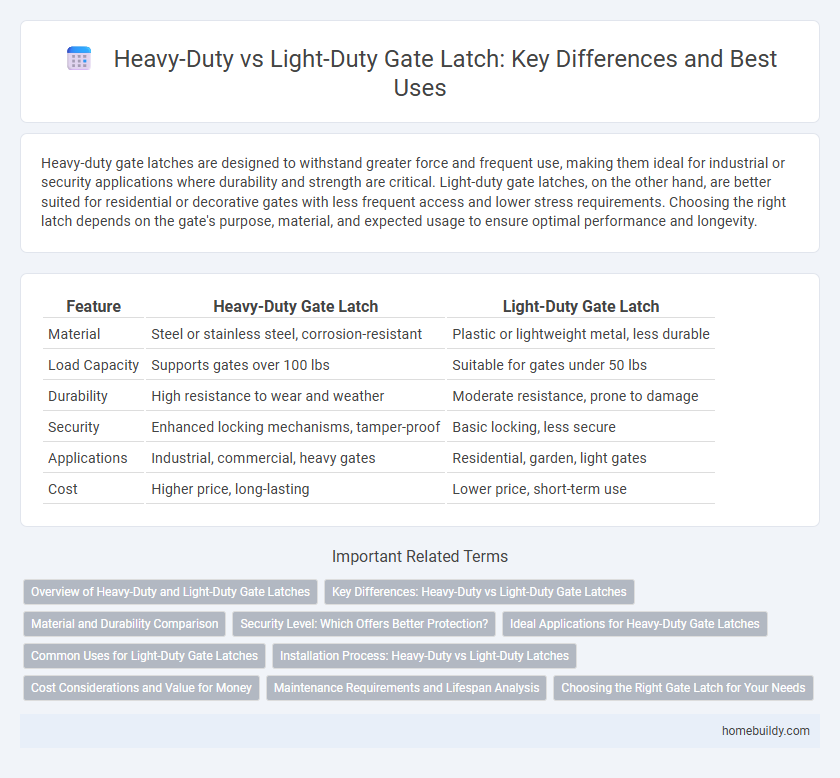Heavy-duty gate latches are designed to withstand greater force and frequent use, making them ideal for industrial or security applications where durability and strength are critical. Light-duty gate latches, on the other hand, are better suited for residential or decorative gates with less frequent access and lower stress requirements. Choosing the right latch depends on the gate's purpose, material, and expected usage to ensure optimal performance and longevity.
Table of Comparison
| Feature | Heavy-Duty Gate Latch | Light-Duty Gate Latch |
|---|---|---|
| Material | Steel or stainless steel, corrosion-resistant | Plastic or lightweight metal, less durable |
| Load Capacity | Supports gates over 100 lbs | Suitable for gates under 50 lbs |
| Durability | High resistance to wear and weather | Moderate resistance, prone to damage |
| Security | Enhanced locking mechanisms, tamper-proof | Basic locking, less secure |
| Applications | Industrial, commercial, heavy gates | Residential, garden, light gates |
| Cost | Higher price, long-lasting | Lower price, short-term use |
Overview of Heavy-Duty and Light-Duty Gate Latches
Heavy-duty gate latches are engineered with robust materials such as stainless steel or cast iron to withstand high stress and frequent use, making them ideal for industrial, agricultural, or security gates. Light-duty gate latches, typically made from lighter metals or plastic, suit residential or garden gates with minimal force and lower security requirements. The key differences lie in their durability, size, load capacity, and resistance to weather conditions, where heavy-duty latches offer enhanced strength and longevity compared to their light-duty counterparts.
Key Differences: Heavy-Duty vs Light-Duty Gate Latches
Heavy-duty gate latches are constructed from robust materials like stainless steel or reinforced iron, designed to withstand higher impact and provide enhanced security for large, frequently used gates. Light-duty gate latches utilize lighter metals or plastic components, suitable for smaller gates with minimal security requirements and less frequent usage. The key differences lie in durability, load capacity, and application, with heavy-duty latches offering superior resistance to weather and tampering compared to light-duty latches.
Material and Durability Comparison
Heavy-duty gate latches are typically made from reinforced steel or galvanized iron, offering superior resistance to rust, corrosion, and physical impact, ideal for high-traffic or security-sensitive areas. In contrast, light-duty gate latches often use lighter metals like aluminum or zinc alloys, which provide basic protection but are prone to wear and structural fatigue under frequent use. Durability-wise, heavy-duty latches maintain their functional integrity over longer periods, withstand harsh weather conditions, and support heavier gates, while light-duty options are better suited for low-traffic, decorative, or interior garden gates.
Security Level: Which Offers Better Protection?
Heavy-duty gate latches provide superior security levels compared to light-duty options due to their robust materials, such as hardened steel, and reinforced locking mechanisms that resist forced entry and tampering. Light-duty latches, often made from thinner metals or plastic components, are more susceptible to breakage and offer minimal protection against intruders. For high-security applications, heavy-duty gate latches deliver enhanced durability and reliability critical for safeguarding properties.
Ideal Applications for Heavy-Duty Gate Latches
Heavy-duty gate latches are designed for industrial, agricultural, and commercial applications where durability and security are paramount, making them ideal for securing large gates exposed to harsh weather or frequent use. These latches typically feature robust materials like stainless steel or heavy-gauge steel, providing resistance to corrosion, tampering, and heavy impact. In contrast, light-duty gate latches are better suited for residential or low-traffic areas where minimal force and security needs are present.
Common Uses for Light-Duty Gate Latches
Light-duty gate latches are primarily used for residential garden gates, interior fences, and lightweight wooden or metal gates where minimal security is required. These latches offer easy installation and operation, making them suitable for frequent use in low-traffic areas. Common materials include plastic, aluminum, and light steel, which provide sufficient durability without the bulk and expense associated with heavy-duty options.
Installation Process: Heavy-Duty vs Light-Duty Latches
Heavy-duty gate latches require a more robust installation process involving reinforced mounting with heavy-gauge screws and often the use of anchors or welding for enhanced durability. Light-duty latches can typically be installed with basic hand tools, using standard screws suitable for wood or metal gates without additional reinforcement. The installation complexity and tools needed directly reflect the latch's intended use and load-bearing capacity.
Cost Considerations and Value for Money
Heavy-duty gate latches typically cost more upfront due to their robust materials and enhanced security features, making them ideal for commercial or high-traffic applications. Light-duty gate latches offer a lower initial investment and suffice for residential or low-traffic gates but may require more frequent replacement or maintenance over time. Evaluating the total cost of ownership, heavy-duty latches provide greater long-term value and reliability despite higher initial costs, while light-duty options prioritize budget constraints with less durability.
Maintenance Requirements and Lifespan Analysis
Heavy-duty gate latches typically require less frequent maintenance due to their robust construction using materials like stainless steel or brass, which resist corrosion and wear, extending their lifespan to upwards of 10-15 years under regular use. Light-duty gate latches, often made from galvanized steel or plastic components, necessitate more frequent inspections and lubrication to prevent rust and mechanical failure, generally lasting 3-5 years before replacement is needed. Choosing a heavy-duty latch ensures longer service life with reduced maintenance efforts, particularly in high-traffic or outdoor environments exposed to harsh weather conditions.
Choosing the Right Gate Latch for Your Needs
Heavy-duty gate latches offer enhanced durability and security, making them ideal for high-traffic or industrial gates exposed to harsh weather and frequent use. Light-duty gate latches are suitable for residential or garden gates with minimal stress, providing ease of installation and cost-effectiveness. Selecting the right gate latch depends on gate material, frequency of use, and security requirements to ensure optimal functionality and longevity.
heavy-duty gate latch vs light-duty gate latch Infographic

 homebuildy.com
homebuildy.com